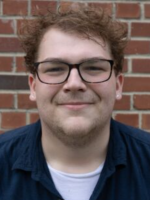In the days, weeks and months after Hurricane Katrina, people displaced from New Orleans found shelter and came to Baton Rouge en masse. Faith groups of all kinds took the call to help their needs both spiritually and physically.
Report for America corps member Alex Cox spoke with retired Interfaith Federation executive director Reverend Robin McCullough-Bade about how Katrina weighs on people’s spirits to this day. Rev. McCullough-Bade held a service at Shiloh Missionary Baptist Church on Aug. 28. She said she wanted to give people a chance to heal.
This interview has been edited for length and clarity.
ALEX COX: How does Katrina sit in the heart of people to this day?
REV. MCCULLOUGH-BADE: I think most of us are in denial that it's sitting there. And there are people who, who wanna skip this anniversary, they don't wanna deal with it. Well, they're dealing with it in some way. It's in their body. And so it's like anything, it can have power over us unless we begin to name it, unless we sit with it, unless we ask the question.
Where is it sitting? Those experiences, trauma also sit within us. They make up who we are and they have shaped us.
COX: Right now, everything feels so divided. How do you think you take the lessons of this time to bring people back together without that tragedy?
So we often talk about getting back to normal, never get back to normal.
MCCULLOUGH-BADE: What is the new normal? And now our new normal is one that is so divided and there's so much strife right now. It's like an unnamed hurricane that we're facing that pulls us together and leaves people disoriented. And so these are challenging times. In a different way than what Hurricane Katrina did then.
It was concrete. People needed food, they needed shelter, they needed their basic needs met. And so right now there's a basic need that is not being met. And I think it's one of a sort of internal safety, that there are people that are afraid to walk the streets and talk to their neighbor and to disagree with somebody.
COX: It almost feels like. A lot of people after everything have kind of forgotten what it took to come together, what it felt like to kind of come together. Would you say that, um, that's true.
MCCULLOUGH-BADE: Oh, that's true. And, within a few years after Katrina, the churches, synagogues, mosques, were less populated people moved back.
After a tragedy, people get going on their own again. And so, when we are not forced to work together to interact. To talk to each other. We go back into our own, silos and it's more comfortable
COX: With all we've talked about. How has Katrina become a modern myth?
MCCULLOUGH-BADE: You know, if you get people to tell their Katrina tale. It will be like it happened yesterday. This week I've had a chance to talk to many people. There is an immediacy to their story. which tells me the trauma is still with us. It's not like, “oh, long ago. What were the details?” There is a sharpness of telling the story with incredible detail. For those who did not live through Katrina, or I guess we can't live in that kind of urgency or that kind of presence to pain.
At the time of Katrina, we couldn't imagine two years in advance. We couldn't imagine sometimes 20 minutes in advance the people in your office or in the hallway or on the street. The needs were so great that you barely had time to eat. So here we are 20 years later. I think finally this is the time for us to say what were the lessons that we learned from that.
You know, the fact that we could smile again. You know, there was a point, it was like, will we ever laugh again? It felt like there was ash on your skin and there was a thickness in the air. And I remember in November after Katrina, I heard someone who had gone through 9/11, and she laughed. It was like, we might laugh again.



